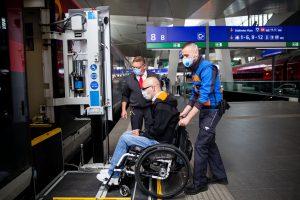
On 1st October, the European Parliament and Council negotiators reached a provisional political agreement on stronger rail passenger rights under the updated legislation that will enter into force after the agreed rules are published in the Official Journal of the EU and become applicable 24 months later.
The provisional agreement is subject to approval by the Council. The presidency will brief the Council’s Permanent Representatives Committee (Coreper) on the outcome of the trilogue meeting on 7 October. It intends to submit the agreement for endorsement by Coreper in the coming weeks.
The revised rules will guarantee rerouting and help passengers when there are delays and cancellations, improve access and assistance to people with disabilities or reduced mobility, and help to create more dedicated spaces for bicycles.
The new rules will encourage rail companies to provide more and improved services. In the spirit of the Green Deal, passengers will be entitled to take their bikes on board as a general rule, while the rail operators will need to create an adequate number of bicycle carriage spaces.
The new rules will make through-tickets mandatory if connecting trains are run by a sole railway undertaking, for example when a journey involves a connection between a regional and a long-distance train. A through-ticket is a single ticket which is valid for all or a number of successive train connections in a journey and safeguards the rights to re-routing and compensation in case of delays or missed connections.
While the current regulation allows a large number of exemptions, the new rules will apply to an increased number of services. In addition, the agreed text clarifies passenger rights in case of delays and cancellations and strengthens the rules on re-routing. The agreed text introduces a force majeure clause for rail companies so that they are not obliged, in exceptional circumstances, to pay compensation. This will help ensure that there is a level playing field between transport providers representing different modes of transport.
“We reached an important agreement for the future of European rail transport. We managed to secure the same minimal passenger rights all over the EU when it comes to spaces for bikes, through-tickets and rights of passengers with reduced mobility. Those are important improvements in making rail travel more convenient and passenger-friendly,” said rapporteur Bogusław Liberadzki.
Rerouting and assistance
In case of delays of over 100 minutes, the rail operators will be obliged to reroute passengers in any way possible and assist travellers to find the best alternatives, as is the case with air carriers.
Under the new rules, rail operators would have to provide through-ticketing on all their routes, covering all legs of the journey with a similar high level of protection.
Passengers with reduced mobility
The deal includes a shorter pre-notification obligation and better assistance for disabled people. Travellers with reduced mobility should notify the operator of their travel plans 24 hours in advance. Under current rules, they have to notify the operator 48 hours in advance.
More bicycles on board
To provide more sustainable mobility and comfortable alternatives, all trains will have to be equipped with dedicated spaces and racks for bicycles.
The provisional agreement also ends the existing exemptions for long-distance domestic services by December 2024 and provides more clarity on what can be considered a force majeure.
The new passenger rights will cover also regional services and will include the rerouting obligation, through-ticketing option and assistance to all passengers, especially to those with reduced mobility.
In 2017 the European Commission announced the proposal to update the rail passenger rights that were into force since 2009. The negotiations for the revised passenger rights began in January 2020.
Share on:



